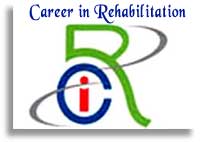REHABILITATION
Introduction to the Career
A rehabilitation worker identifies the client's specific difficulties and develops a plan of action to remove or reduce the barriers the client faces. The first step is to determine the nature and extent of the disability and evaluate how that disability interferes with work and other life functions. This determination is made from medical and psychological reports as well as from family history, educational background, work experience, and other evaluative information. The next step is to determine a vocational direction and plan of services to overcome the handicaps to employment or independent living.
The rehabilitation counselor or worker coordinates a comprehensive evaluation of a client's physical functioning abilities and vocational interests, aptitudes, and skills. They deal with the whole person and work with each client to develop an individualized rehabilitation plan including training to increase the individual's capacity to live independently, and in many cases help to develop job skills, obtain jobs, and be included in the community.

Today, the need for rehabilitation extends to persons of all age groups who have disabilities. But every rehabilitation service professional cannot be trained in dealing with all of these varied disabilities in different age groups. So while considering a career in this field, one has to consider what category of people they are interested to work with, such as people with mental disability, physical disability, anti- social behaviour and so on. Rehabilitation centres, mental health centers, community service programs, public health departments, state and central vocational rehabilitation departments, colleges and universities, special schools and residential care houses are equipped with the necessary tools to help patients adjust to living independently with their disabilities. Some Rehabilitation Therapists/workers may choose NGOs working for rehabilitation of children, elderly people and disabled. They also have the option to open their own rehabilitation clinics.
Those who obtain a doctorate in rehabilitation counseling or related field may teach or conduct research at the college or university level. Often rehabilitation professionals work along with other social service professionals, medical specialists and therapists. The duties of a rehabilitation worker/professional vary depending upon the people with whom they work and the setting in which the work takes place. Regardless of the population or setting, rehabilitation professionals help people deal with the personal, social, physical and vocational impact of their disabilities. Most rehabilitation workers work with special groups which include the blinds, the mentally ill, physically disabled, hearing impaired, mentally retarded, autistic children, elderly people, prisoners, etc. The clients of a rehabilitation worker can be of any age, gender, ethnicity or religion. Again, some specialize within a larger group. For example, a rehabilitation worker may work exclusively in the area of vocational rehabilitation or occupational therapy. Rehabiliation workers serve not only the patients but also the families of the patient.
Areas of work

Special education really requires teachers who must be organized, patient, able to motivate students, understand their students special needs and accept differences in others. Special education teachers help their students progress not only academically but also behaviorally by helping them develop emotional awareness, conduct themselves in a manner that is socially acceptable, and feel comfortable in social situations. Special education teachers spend much of their time working with students, parents, school faculty and administrators and others. They must have the ability to communicate effectively and be cooperative. As these teachers work with students who have learning difficulties, they must be creative and apply different types of teaching techniques to reach every student.
Clinical/Therapeutic Rehabilitation-
This is the science which is usually meant to provide clinical and specific therapeutic services to persons with disabilities. Such therapists play a vital role in helping physically challenged individuals who acquire skills that will enhance their quality of life. They serve developmentally disabled patients to help regain their physical, social and mental abilities through therapeutic activities and exercises. Therapeutic rehabilitation mostly consists of the many group of professions related to Occupational Therapy, Physical Therapy, Rehabilitation Counseling, Art Therapy, Prosthetics and Orthotics, Recreation Therapy and Speech Pathology. The strategies of these therapists include exercise, creative arts, massage, heat, light, water, electricity and specific therapeutic apparatus. Individuals recovering from a wide range of surgeries, injuries or illnesses, elderly persons, those recovering from accidents and many other groups of people rely upon rehabilitation therapy professionals to improve their quality of life and overall health. Rehabilitation Therapy has also been proven to provide significant benefits to patients with ongoing medical conditions such as: Joint replacements, Arthritis, Orthopedic Surgery, Strokes, Amputation, Open Wounds and Neurological conditions.
Psychosocial Rehabilitation
Such professionals provide community based support and services to all people diagnosed with severe mental illnesses. The goal of psychosocial rehabilitation is mostly to teach skills and provide community support so that individuals with a mental illness can function in social, vocational, educational and familial roles. It not only includes medical and psycho-social treatment but also ways to foster social interaction, promote independent living and encourage vocational performance. There are career opportunities in a variety of psychiatric and community mental health settings.
Vocational Rehabilitation
This kind is the continuous and coordinated process of rehabilitation science, which is meant for pre-vocational and vocational training, vocational guidance and counseling, selective placement designed to enable an adult disabled person to secure and retain suitable employment for their independent living. A vocational rehabilitation personnel is a counselor who develops and implements educational and supportive programs to increase the clients employability. Their support may include job training, making the person comfortable at their workplace, counseling on how to improve their performance or change habits that were not perceived favorably at the workplace. They usually work with adults and not with children. They may work with mentally and emotionally disabled or who have suffered the loss of their capacity to continue in a career field because of illness or injury.
Rehabilitation Management and Administration
Rehabilitation |
But every rehabilitation service professional cannot be trained in dealing with all of these varied disabilities in different age groups. So while considering a career in this field, one has to consider what category of people they are interested to work with, such as people with mental disability, physical disability, anti social behaviour and so on.
